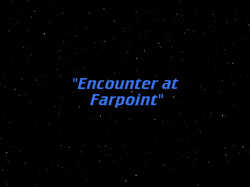
Generally this gets put down to the almost total lack of even half decent small screen sci-fi at the time, but I think, as we'll discuss, that's a little unfair and season 1 is a lot more watchable than it's usually given credit for.
Over here in the UK TNG had the misfortune to coincide with a period when the BBC were in full on “Science fiction isn't popular” mode (it was at the same time they were desperately hoping if they ignored the Sylvester McCoy Doctor Who years it would just vanish in a puff of smoke) meaning it was met with almost complete disdain despite the original series being a tea-time staple since the end of the 60's. The new show would eventually, half apologetically, come to BBC2 in 1990 in a time slot that would often see bits cut out or entire episodes cancelled in order to make way for such deeply exciting sporting events as International Amateur Tiddlywinks. Not to mention a whole episode being banned for a pro-IRA line when just cutting the line if it was unacceptable would have made more sense. Despite this and (bar a Radio Times cover to launch the run) a general lack of publicity it did very well for our second channel. So well they lost the first run rights to Sky after season three.
Pre-BBC 2 though we had the sell through video market that was my first exposure to the series. Thanks to my Mother being a massive Trekie (around this time she even went to a convention in Birmingham. For which Sylvester McCoy was guest of honour) we got the various rental tapes and their increasingly odd looking artwork that made the subsequent “Randomly cut out photo” sell through covers look like design classics. The drawn by a five year old Tasha on the original Skin of Evil cover is marvellously tacky.
So despite the BBC's disinterest I saw, and enjoyed, most of the first season of TNG relatively close to it going out in America, with magazines like TV Zone and Starburst making later episodes sound exciting and exotic. As a family watching it we weren't blind to the show's faults- Troi is possibly the single most pointless character in all of fiction- but we enjoyed it nonetheless.
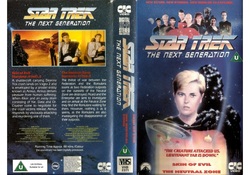
The pleasant surprise is how genuinely good the whole thing looks. Instead of showing the flaws in everything it instead reveals all the extra little details every set and prop has on it that no one involved could ever have expected to become visible. After two decades of “Too beige, too much a hotel in space, too bright” the Enterprise D comes alive again. This is one damn good looking show even by modern standards.
Special praise has to be given to the main Enterprise D model, no longer just a big silver blog there's green and light blues on there that were invisible on DVD, and things like the docking ports and escape pods stand out much more. TNG was probably the last great model show, and they get to look at their best here.
So, as a remastering project the blu ray can be considered a huge success. It's taken a lot of work for big technical reasons (in short: Despite being shot on film it was edited on video which is why TNG; and most other US SF shows made afterwards till the end of the '90's; frequently looks soft and blurry. To make it HD CBS have had to re-edit the episodes from scratch by going back to the original rushes) but makes shelling out for the upgrade from DVD entirely worthwhile by itself.
But of course, you can't polish a turn (even if this would now be a very shiny turd indeed), so how well does Encounter at Farpoint manage as a piece of entertainment?
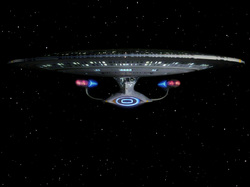
The thing that is slightly tricky in retrospect is how it's a pilot for an almost entirely different show than the one it will become. As well as an awful lot of time spent on things like saucer separation and Riker being the main lead whilst Picard is an avuncular background character a lot of the basic style is very different.
This is mainly shown by families being on board. The Enterprise D is very much a flying city in space, one that even in the pilot is at the edge of explored space. They're going to be in the unknown for years, decades even, a very long way from home. Having their children and loved ones on-board makes perfect sense in this context, especially as the pilot is clearly aiming for a more thoughtful and less action orientated feel meaning that, in theory, they should never be placed in very much direct danger.
From almost the second episode onwards this will change. Patrick Stewart being the best actor on the series (often making potentially terrible material in the earlier shows far better than it should be) would see his role increase to the point Riker will start looking redundant. The show will spend most of its run in Federation space within easy contact distance of home making the crew look socially maladjusted because they can't work for a short while without their kids. The action quote will increase exponentially putting the ship in danger almost every week. And the saucer separation idea that's supposed to protect the civilians is forgotten almost instantly.
It became a series where the idea of having children on-board becomes so ludicrous that by the time you get to the film Generations you have the two writers in the commentary, Braga and Moore (neither of whom were there in the early days), genuinely puzzled as to how it was ever supposed to work.
Whilst it's unfair to judge the pilot on what happened afterwards, it's hard not too when so many scenes in it are devoted to setting up stuff that will either be irrelevant or a hindrance (such as the psychiatrist having the seat next to the Captain on the bridge. Marina Sirtis is a likeable performer who improves a lot over the years but this never really makes any sense) to the next seven years. The reattachment of the saucer section alone seems to go on forever.
So outside of the set up that quickly gets set down, what does the pilot have? Two completely different and separate A plots, one of which is fairly fun- if hackneyed- and the other of which is dull and predictable.
Encounter... was originally conceived as a one hour episode before being extended to double length at Paramount's request. This resulted in Gene Roddenberry slapping the equivalent of an entire episode onto DC Fontana's script. Perhaps surprisingly; especially considering his current reputation as a power crazy sex maniac who made more bad Star Trek than good; it's his stuff that works best.
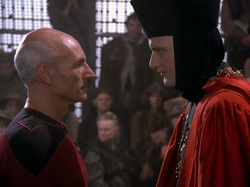
This is mostly down to John de Lancie, a hugely fun actor who, here at least, can manage to being larger than life without being too hammy (let us never speak of Hide and Q again). His various costume changes and the depiction of a post-World War III courtroom; complete with comedy midgets; have a nice feeling of tension and strangeness to them that's pretty much lacking from the rest of the episode.
It also helps that de Lancie gives Patrick Stewart the chance to go toe to toe against an actor with more charisma and presence that the rest of the regulars combined. The only one who comes close is Brent Spiner, who at this stage is somewhat hamstrung by Data being a walking exposition machine rather than a character.
Sadly, the point where Q exits stage left with the threat of “Go deal with this other plot or you'll be in trouble” the story basically starts all over again. The additions aren't very well integrated into the original script and it's easy to imagine the version that opens with Picard's introductory log and then cuts straight to Riker finding Farpoint all mysterious.
Another result of all this is the middle third has a strange lack of urgency to it because everyone's still written as if they're at the start of an episode rather than working towards a lethal deadline as set down by Q. It means scenes of Riker causally walking round the Holodeck (a brilliant idea mind) and chatting to Data in the most lethargic way possible are totally out of place. It's a pity a bit more effort couldn't have been put into reworking the whole story to make the episode flow better.
As an aside, considering there would have been a need to establish it (and more importantly ensure the stock shots were done by ILM as part of the pilot's bigger budget) I wonder how a saucer separation would have been included in the hour version? Presumably to move the families out of harms way when the Mysterious Alien Ship shows up?
All that said, the DeForest Kelley came touring the new Enterprise as the oldest and crankiest “Unnamed Admiral” in Star Fleet is extremely lovely. Though it does show up the pacing problems that the mid-point that forms the cliffhanger in the two part version of this story is an old man walking down a corridor very slowly. TO BE CONTINUED indeed.
A large chunk of this segment is given over to establishing the regulars. I may well be alone in really liking the aloof way Picard treats Riker when they first meet. It's often held up as exhibit A in “Early Picard is a bastard” arguments but I rather enjoy how he very deliberately pushes his new Number One's limits so as to see how he reacts.
Despite the info-dumping Data is surprisingly likeable, Worf manages to make a great impression just through Michael Dorn's screen presence and Riker and Geordi are mostly harmless if not exactly brimming with personality at this point. Geordi does occasionally veer into being written how middle aged white guys think a young black man talks, but just about manages to avoid it (less so in The Last Outpost where he'll be borderline jive-talking).
The female characters are the problem. Troi's actual purpose is incredibly poorly defined and thankfully soon to be toned down endless cries of “PAAAAAAAAAAAAAAIN” whenever she senses anything makes you long for an airlock accident. Tasha Yar is only marginally more convincing as a security chief when she's alive than after she was killed by a tar pit (hilariously even in this first episode Worf is more convincing as the ship's muscle and he's only supposed to be driving at this stage) and Doctor Crusher...
Well she's probably my least favourite Trek character. After all, Neelix doesn't bother me because he's in a terrible show, Crusher is in a series I actually like to watch which is much more annoying. Gates McFadden is by far and away the most wooden of the regulars (in sharp contrast to Crosby's tendency to SHOUT HER LINES IN A FAILED ATTEMPT TO LOOK TOUGH) and, though we're not quite at the “You can't do that Jean-Luc” stage yet she's amazingly annoying. And pretty much purely defined in how she relates to two of the male characters rather than as one in her own right as well.
To Picard, she's the woman whose husband died under his command that he wants to bang the (admittedly shapely) arse off. And to Wesley she's “Mom”. Showing you can be a career mother is in theory great, but couple McFadden's leaden performance with Will Wheaton being well out of his depth trying to handle some truly atrocious smug git lines and you have the main two weak links in the original cast (though the reason I'm not as overall down on Wesley as his mother is due to him both improving alongside Wheaton's acting and him having the good grace to bugger off in season 4).
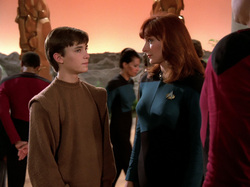
The mystery side of things is also introduced fairly badly. It turns out the Bandi can make things you want appear out of thin air. Something so shocking it makes Riker very nearly display a second facial expression (the beard will really loosen up Frakes').
The daft thing is that; even ignoring the fact we're a few episodes away from food replicators appearing from the first time; is that one of Data's big exposition speeches is about how the holodeck does pretty much the same thing. Using transporters to create plants and rocks from nothing. So the main mysterious and sinister thing about the Bandi is- at best- that they have slightly more advanced technology than Star Fleet and can replicate things silently. Oooohhhhh.
Things do pick up though when an Away Team explores the tunnels under Farpoint, there's a nice spooky atmosphere as long as you mute Troi's wailing.
The episode climaxes when an unknown alien ship turns up and starts attacking the place where the Bandi live but not the new station. The length of time it takes Picard to do anything to deal with the attack directly is something of a problem. The fact he's looking to only use violence as a last resort is great, as is TV that values thinking your way out of a problem rather than fighting. It's the direction and pacing that are off, once again making it all feel very lethargic. A bit more of a sense of urgency and the crew going through their options quickly would have greatly helped it seem less like they were being very casual whilst lots of Bandi (most of whom are innocent of the Evil Plot) are being blown up.
This is the point where Q shows up again and you realise how much you've missed him. The main Bandi baddy; despite both being played by Michael Bell and having the awesome name Groppler Zorn; is very much a wet fish in comparison.
In the end it turns out both the ship and Farpoint are shape shifting aliens, with the later having been captured and forced to do the bidding of the Bandi (making you wonder exactly what Riker was chewing on when he ate that apple). The Enterprise frees Farpoint before cheerfully blasting off onto its next mission so we can have a happy ending before the viewer can think of all the dead Bandi children. Q meanwhile dismisses the whole thing as being too simple, and frankly it's hard not to agree with him.
Looking back on what I've just written, it makes this pilot look far worse than it felt whilst re-watching it. I guess there is a real drastic difference between how objectively good the various elements in it are and how it looks through the warm nostalgic glow brought on by happy memories of sitting down as a family.
Or maybe it's just the insanely short skant Troi is wearing. I am nothing if not shallow. But shallow in a way Roddenberry would have approved of.
It's not going to win any awards (though it did manage to get Hugo nominated), but there's something strangely reassuring and relaxing about Encounter At Farpoint. It's probably work a lot less well for anyone without any pre-existing fondness for the show but in this new super super sexy format it's going to bring back a lot of pleasant memories for those of us that do.
And from here, I've got 24 episodes that include some fantastic television. Some atrocious stuff as well (hello Justice!) but shows like The Big Goodbye, Where No One Has Gone Before, Conspiracy and Datalore range from fun to excellent. Or as Troi would say, “Great joy”.
The screengrabs on this page are from the excellent TrekCore website, well worth a visit.
[Note: Watch out for problems with the 7.1 sound on some of the discs. My simple stereo set up has worked fine so far with the episodes but apparently there are some issues with the more advanced soundtrack options.]
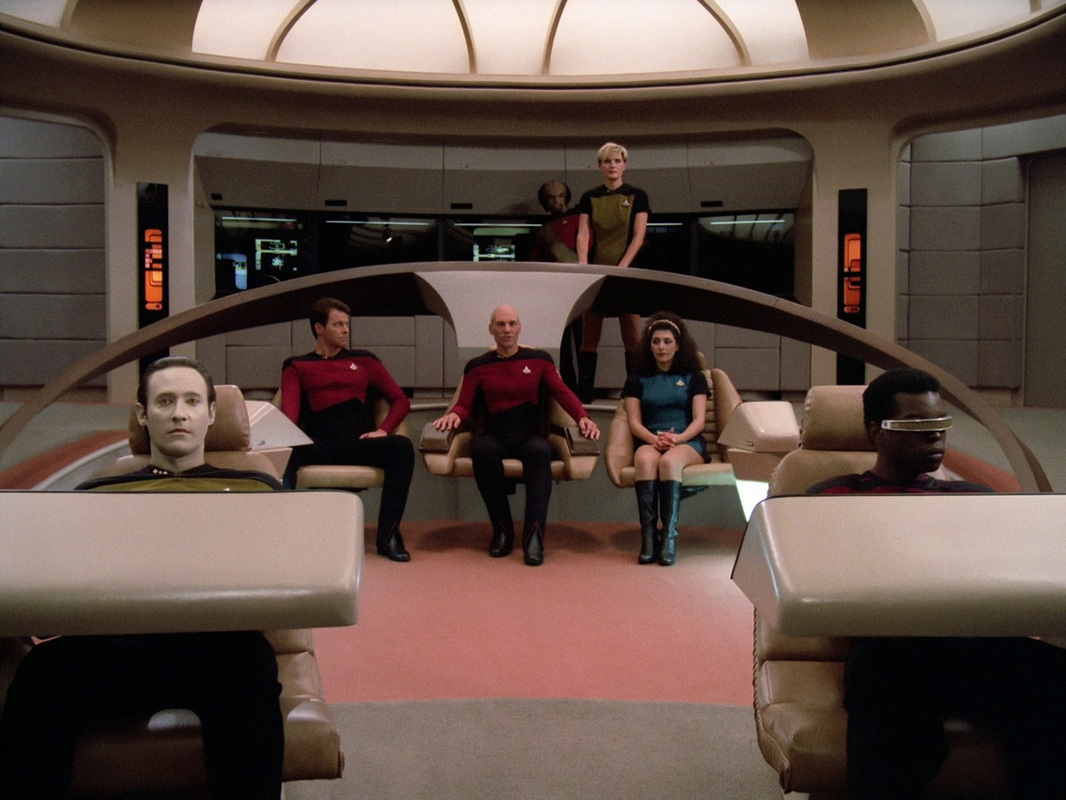
 RSS Feed
RSS Feed
